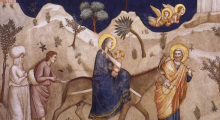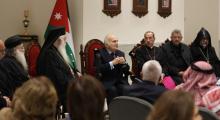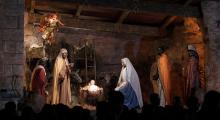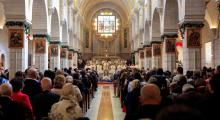Issued by the Catholic Center for Studies and Media - Jordan. Editor-in-chief Fr. Rif'at Bader - موقع أبونا abouna.org
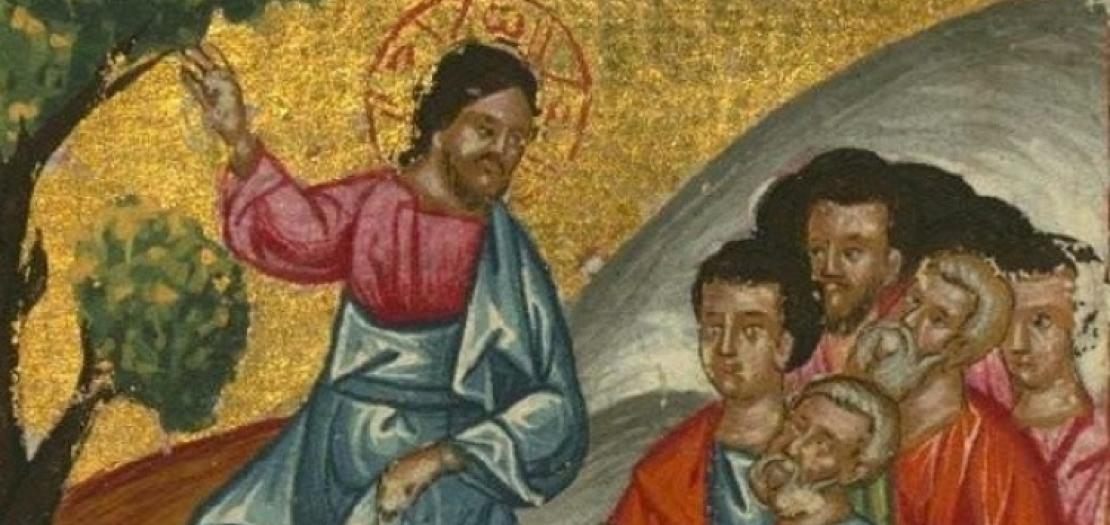
Following is the text of meditation by Cardinal Pierbattista Pizzaballa, Latin Patriarch of Jerusalem, for the 33rd Sunday of ordinary time B, dated November 17, 2024:
The evangelist Mark has his very own way of reporting Jesus’ account of the end times.
In the eschatological discourse that we find in chapter 13 of his gospel, there is no shadow of a possible final judgment to which the nations and individuals would be subjected.
The time of the end is not intended as a time of judgment by God, who sits like a judge on a throne and weighs up and evaluates our failures and good deeds. Life should not be lived in fear of judgment, and what motivates us to act cannot be the fear of doing wrong and being condemned.
But what then can motivate our existence and how can the thought of the end brighten our days?
The passage we read in today’s liturgy (Mk. 13:24-32) is taken precisely from this eschatological discourse and tells us something about the time of the end, which will indeed come.
The first message is just that there will be an end.
All three synoptics have an apocalyptic view of history, i.e. they proclaim that nothing has eternal value apart from God’s presence among us.
Jesus says this with imagery that speaks of a great upheaval: the sun, the moon, the stars, in other words the whole of creation, will somehow be overturned (“But in those days, after that suffering, the sun will be darkened, and the moon will not give its light, and the stars will be falling from heaven, and the powers in the heavens will be shaken.” (Mark 13:24-25).
Nothing is eternal, but everything passes away (Mark 13:31): the heavens, the earth, the lives of the men and women of this world, everything passes away. To live in the knowledge that our life has a limit is a great gift: if we did not know this, we would always postpone the decision about our conversion until tomorrow and since we could always live, we would never live in the end.
In all this upheaval, however, there is also something that does not pass away: for Jesus says that although everything passes away, his word always remains: “Heaven and earth will pass away, but my words will not pass away.” (Mark. 13:31)
It is possible to hear the Lord at any time in history: There is no time or space in which his Word will cease to resound. But not only that: the Word of the Lord is always a creative Word that, when spoken, creates something new. So, we could say that in the depths of this time, which is limited and destined to end, the Word of God is sown, which can always and everywhere bring forth new life.
Our time in particular, with all the dramatic upheavals that we are experiencing, and which often leave us disoriented, becomes a womb of new life if we open ourselves and listen.
Today’s Gospel tells us that the new life, eternal life, is an encounter, an encounter that we are approaching, an encounter that is possible because the Lord is coming. (Mark 13:26)
“Coming” is a significant verb: The Lord is the One who comes, who always comes, who never stops coming into our lives. He has pitched his tent among us and remains faithful to this humanity by always coming, never leaving us and never leaving us alone.
And the last encounter with Him, as we have said, will not take the form of a judgment: We will not have to give an account of our deeds, but see if we can recognize the coming Lord.
But He will only be recognized in the end by those who have learned to recognize Him when He comes in the time of this our life, in the time that is passing away. In this time, the Lord does not come in glory, but he comes in the sacraments of the Church, in the poor and the suffering, he comes in those who cry out their pain and in those who ask for mercy, like Bartimaeus on the roadside of Jericho.
Whoever has listened, whoever has stood before the Lord who comes in humility, will know how to recognize him even when he comes on a cloud from heaven with great power and glory. (Mark 13:27)
And he will not have to be afraid of this encounter: Christians, like everyone else, experience pain and suffering, participate in the dramas of history, but they know that all this will come to an end. And while they await the end of pain, they also await the goal of history, the One who comes from now on and never stops coming.
+ Pierbattista


